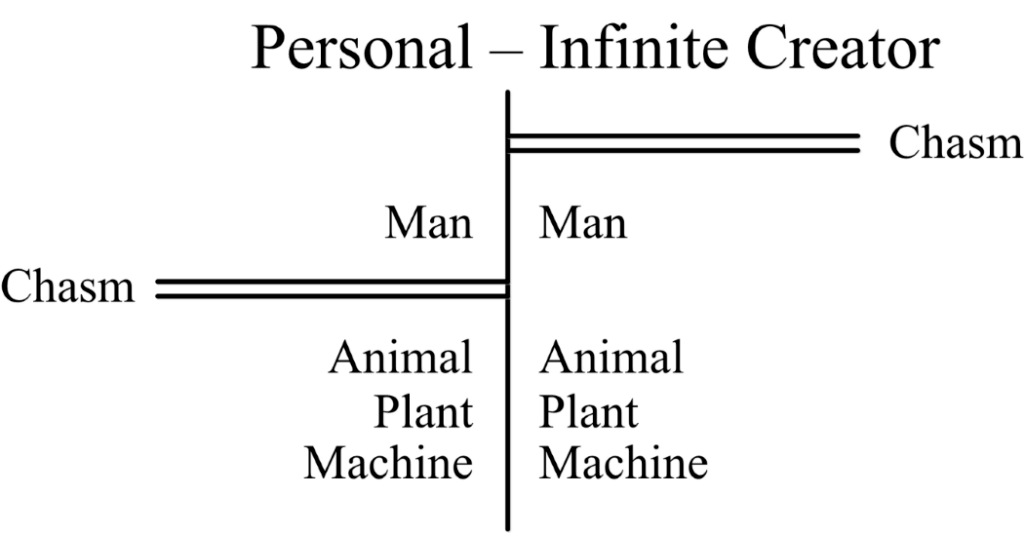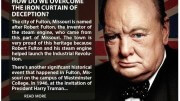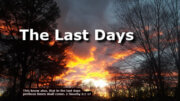Jihad is holy war. One fought in both the physical and spiritual realms. This one is no exception, and it is a war. So far, not a hot war fought with men and material, but a cold one. A war based on ideas and so far fought with information, economies, and technology. The first article focused on two battles in this war—covid and the recent election. Both pertain to the physical aspect. Today’s focuses on the spiritual.
We see a new religion based on oneness that is not new at all. It’s the pagan past repackaged; and only new to us in the present. We’ll begin by comparing some of this religion’s ideas to Judeo-Christian notions. Next time we’ll review its history and some problems inherent in its ideas. Those discussions lead to who supports, or is using, these ideas—and their purpose. They’ve made it plain for those who want to hear. In fact, we’ll see it’s been going on for decades. We don’t realize it because we’ve not learned history. But that, too, is part of this war.
I recently heard Carl Teichrib speak, and have since listened to several of his Bible conference lectures. Carl’s spent over twenty years researching this movement. He’s a Christian who’s gone to their conferences and events to learn what they are about. His current book, Game of Gods,[1] covers his research results. While I’ve not yet read the book, the information presented during his lectures is quite good. His ideas provide some of this article’s framework.
Oneness or Otherness?
The above are today’s words. But they represent ideas several thousand years old. Oneness professes there is no difference between nature, man, and some supreme being, essence, or nature. All is one. Today’s movement focuses on nature—ecology and saving mother earth. Otherness, on the other hand, asserts there is separation between Creator and creation.
Oneness-like ideas were prevalent among the ancient state religion societies, and still exist in eastern religions today. They worshiped creation. Man made his own god(s). In these ancient societies, a close relationship existed between governance and religion. Society was maintained through a class structure imposed from the top, by self-proclaimed elites whose goals included seeing their social order maintained. Those ideas exist within today’s oneness movement.
Another idea within these state religions is creation has always existed. It alone is eternal. Creation within this view is only about transformation. It generally comes about in one of two ways. First, two gods fight. One kills the other. From the dead god the earth, heavens, seas, etc. are made. Second, a male and female god unite and from their union the earth, heavens, seas, etc. are formed. In both cases, creation comes from something that already exists.
We find otherness in the monotheism underlying Judaism, Christianity, and Islam. There is what I call dualism within this idea. But not what is meant by dualism today, where it denotes two opposing forces—such as good and evil. Instead, it refers to an older idea of separation between God and His creation. Within otherness, God alone is eternal; creating creation out of nothing.
Personal/Infinite or Just Infinite?
Francis Schaeffer’s diagram below captures the difference in ideas.[2] It is one of the best I’ve seen. Christians accept the separation between man and God. They accept Him as both personal and infinite. They worship God. Oneness sees only the diagram’s right side—without God. There is only nature and no difference between man and the rest of creation. Those following oneness worship creation. There is nothing else. I’ve written extensively elsewhere about the implications of this difference.

A Biblical Proposition
Throughout history, man has repeated the same error. Some begin to look to themselves for their own salvation. We see it in the Garden of Eden with Adam and Eve eating from the tree of knowledge. (Gen. 3:4-6) Cain’s leaving the Lord’s presence and creating the first city of man. (Gen. 4:16-7) The city of man rebelling against God and trying to become like God by building the tower of Babel. (Gen. 11:4-6) This last item is the first recorded instance of collectivism and attempt at global governance. While the means have changed, the objective hasn’t. Some men still want to be like God.
Those following this path turn away from God and toward themselves. As they have only themselves, they attempt to create their own salvation. They turn to worshiping creation, even themselves, rather than a creator. This course leads only to death, because one rejects truth and accepts what is false. (Rom. 1:21-5) This is liberation theology’s basis. Man attempting to create heaven on earth, using every means possible within the realms of both religion and governance. In doing so they reject God, and develop an appetite for global governance.
The Alternative
God loves us and is always with us. Man can only choose to turn away from that love. (Isa. 41:8-10) Even when we do, God is still there waiting for us to return to Him. All we need do is accept Him and stand fast in what He’s taught us. He will not abandon us. (Isa. 54:4-5) Instead He will gather us from the four corners of the earth. Those who finish the race will find eternal peace in God’s presence. It’s no more complicated than that.
God asks very little in return. First, to consecrate ourselves and be holy. Second, learn how He wants us to live and then act accordingly. Third, obedience to His law. Fourth, worship God in faith, hope, and love. By these we fulfill our purpose.[3]
He desires we love Him and our fellow man—part of God’s creation. God calls us to be creation’s stewards as man was given dominion over the earth—it is not a god.
Being God’s Diplomats
Jonathan Edwards was a significant minister during America’s First Great Awakening. In addition to preaching about Christian principles such as faith, hope, love, and charity; he did sermons about the roles of faith and governance. One sermon on 1 Peter 2:9 explained who Christians are, and their relationship with the world. [4]
A few of those propositions. First, Christians are a distinct nation derived indirectly from God. By accepting God, we accept His governance. Second, we all speak the same language (the Word) and share the same fundamental doctrines. Third, we are one society under the same government. Christ is our king, and we are one body politic. Heaven becomes our native country. Fourth, we are all subject to the same law, and share the same natural rights and common good. Fifth, anyone can join this society of free people. Last, we are each to build and practice virtue.
Carl Teichrib supplied a useful extension to these thoughts.[5] By claiming Heaven as our native country, we become God’s diplomats while on earth—His ambassadors. God’s diplomats have several duties. First, we are to subordinate our personal interests to that of our native country. Second, we live in a foreign country while on earth. Third, we are to understand the culture we live in, but not become part of it. Fourth, we are to communicate our country’s interests and listen to theirs as well. Fifth, we are to alert fellow diplomats within our community about what we learn.
Next Time
This provides an overview of some fundamental differences in ideas between today’s world and Christian ideas. We’ve gone beyond post-modernism, which rejected all notions of God. It left man alone; creating a vacuum that ideas like oneness have rushed in to fill. This article also provides a reminder of who we are as Christians, our role, and our responsibilities. These are things we accepted when baptized into Christ.
The next article provides a brief history of these oneness ideas development. We’ll see these ideas entered Christianity at least a hundred years ago. They’ve been a corrupting influence. We’ll also look at some problems these ideas present. When man turns to himself, there is much he can no longer explain. He becomes irrational. He loses the benefit God’s gift of reason provides.
Footnotes:
[1] Teichrib, Carl, Game of Gods: The Temple of Man in the Age of Re-Enchantment, Whitemud House Publishing, 2018.
[2] Schaeffer, Francis, p. 26, Escape from Reason, InterVarsity Press, 1968.
[3] Wolf, Dan, p.4-5, A Handbook of Natural Rights, Living Rightly Publications, 2018.
[4] Edwards, Jonathan, pp. 936-949, The Works of Jonathan Edwards, Vol. 2, Hendrickson Publishers, 2006.
[5] Teichrib, Carl, Spiritual Politics and the Cult of World Order and Game of God’s, Encounters in Divine Identity, 2019 Last Days Bible Conference, https://www.youtube.com/watch?v=wzvp_ZZrmG0 and https://www.youtube.com/watch?v=bqbrt4jDn18 respectively. Both accessed November, 2020.





